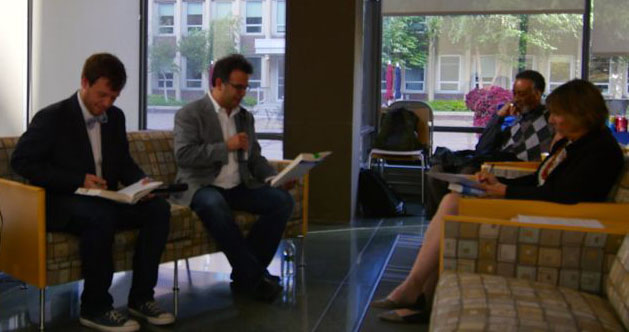The value of caring in the classroom
 Three former English teachers sat in the front of the room and talked about the less-heralded metrics educators can use to measure student progress. On October 5, Dean Pam Grossman hosted educational leaders Chris Lehmann and Zac Chase at a Penn GSE Centennial event to read from their new book, Building School 2.0: How to Create the Schools We Need. Together with Grossman, they discussed their learning philosophy and talked about how educators can create inquiry-based schools that challenge students to become engaged, compassionate citizens who can think through problems.
Three former English teachers sat in the front of the room and talked about the less-heralded metrics educators can use to measure student progress. On October 5, Dean Pam Grossman hosted educational leaders Chris Lehmann and Zac Chase at a Penn GSE Centennial event to read from their new book, Building School 2.0: How to Create the Schools We Need. Together with Grossman, they discussed their learning philosophy and talked about how educators can create inquiry-based schools that challenge students to become engaged, compassionate citizens who can think through problems.
Lehmann, the founding principal of Philadelphia’s Science Leadership Academy (SLA), Chase, a former SLA teacher now working for the U.S. Department of Education, and Grossman offered a vision for assessment beyond standardized tests.
“I taught kids English,” Chase said. “My metric was ‘Do they like reading and writing better than they did when they started the year?’”
“Are your students growing into the kind of adults you would want to know?” Lehmann asked.
“Saying these outcomes are important, and we actually do have measures of the outcomes, and can point to the kinds of adults our students become, that’s very compelling,” Grossman said. “That’s not just about the test scores. These are things we can track and see the impact.”
These sorts of measures are an outgrowth of the humanistic, inquiry-based model Lehmann and Chase developed at SLA. The school has built its mission on helping students be thoughtful, wise, passionate, and kind.
In their book, Lehmann and Chase write that to teach in an inquiry-based system, teachers have to believe that their own voices should not be the only ones that matter in the room. They also have to be their true selves in front of their students, not the removed figure teachers — especially young teachers — are often encouraged to be.
“If you wouldn't want to be taught by you, don’t be that person,” Lehmann said. “If you didn’t like teachers who were cruel in the classroom, don’t be cruel.”
“Be authoritative, but know your authority comes from a place of compassion and care, and your ability to know every child in that room, not your ability to stand in front of the room and tell them everything you know.”
When asked what advice he had for future teachers, Chase said to get involved in a school, and find out what works for you and what doesn’t.
“Get your hands dirty as quickly a possible,” Chase said. “The sooner, the better. The more reflective you can be, the better.”
Before he founded SLA, Lehmann was a classroom teacher. He had never overseen a school before. His first task was to create a plan, which was a defining moment for him. He recommended the approach for an educator preparing to take on a greater leadership role.
“Write your own school plan,” Lehmann said, explaining that this was the genesis of SLA’s core values. “Having to define what you believe by what you would build is a wonderful thing.” Lehmann recently added Assistant Superintendent of Innovative Schools to his title, and is currently responsible for opening new schools in the School District of Philadelphia.
